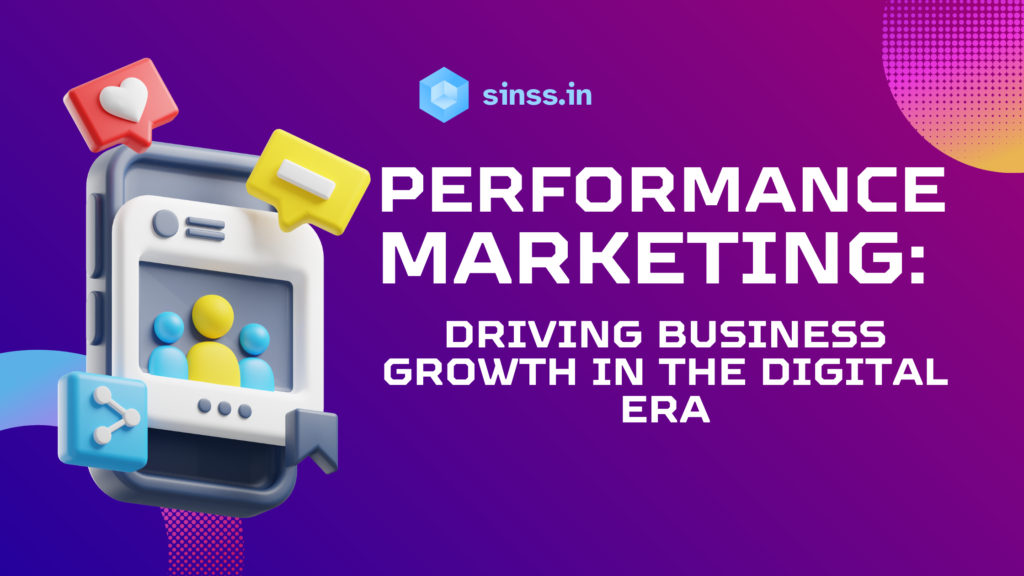
Performance Marketing: Driving Business Growth in the Digital Era
In today’s hyper-competitive digital landscape, businesses are constantly seeking innovative ways to reach their target audience and drive measurable results. Performance marketing has emerged as a powerful strategy to achieve these objectives efficiently and effectively.
What is Performance Marketing?
Performance marketing is a comprehensive approach to advertising and marketing where advertisers pay only for specific actions or outcomes, such as clicks, leads, or sales. Unlike traditional advertising methods where payment is made upfront regardless of results, performance marketing focuses on measurable performance metrics.
Importance of Performance Marketing in the Digital Age
In the digital age, where data-driven decision-making is paramount, performance marketing offers unparalleled advantages. By leveraging data analytics and measurement tools, businesses can track the performance of their campaigns in real-time, optimize strategies based on insights, and maximize return on investment (ROI).
Key Components of Performance Marketing
For a performance marketing campaign to be successful, several key components must be considered:
Target Audience Identification
Understanding the demographics, interests, and behaviors of your target audience is crucial for effective targeting and message optimization. By segmenting the audience based on relevant criteria, marketers can tailor their campaigns to resonate with specific consumer segments.
Clear Objectives and Key Performance Indicators (KPIs)
Before launching a performance marketing campaign, it’s essential to define clear objectives and KPIs. Whether the goal is to increase website traffic, generate leads, or drive sales, having measurable metrics ensures accountability and allows for performance evaluation.
Data Analytics and Measurement Tools
Performance marketing relies heavily on data analytics and measurement tools to track campaign performance, analyze consumer behavior, and optimize strategies accordingly. From Google Analytics to advanced attribution models, marketers have access to a plethora of tools to gather actionable insights.
Read More: Best SEO Strategies for 2024: Boost Your Online Presence

Different Strategies in Performance Marketing
Performance marketing encompasses a variety of strategies, each tailored to achieve specific objectives:
Search Engine Marketing (SEM)
SEM involves promoting websites by increasing their visibility in search engine results pages (SERPs) through paid advertising. With platforms like Google Ads, marketers bid on keywords relevant to their business to display ads to users searching for related products or services.
Social Media Advertising
Social media advertising enables marketers to reach their target audience on popular social platforms such as Facebook, Instagram, Twitter, and LinkedIn. By leveraging demographic and interest-based targeting options, advertisers can deliver highly targeted ads to users based on their preferences and behaviors.
Affiliate Marketing
Affiliate marketing is a performance-based advertising model where businesses reward affiliates for driving traffic or sales to their website through affiliate links. Affiliates, also known as publishers or partners, promote products or services and earn a commission for each successful referral.
Influencer Marketing
Influencer marketing involves collaborating with influential individuals on social media to promote products or services to their followers. By leveraging the credibility and reach of influencers, brands can increase brand awareness, credibility, and engagement among their target audience.
Advantages of Performance Marketing
Performance marketing offers several advantages over traditional advertising methods:
Cost-Effectiveness
Unlike traditional advertising where payment is made upfront, performance marketing allows advertisers to pay only for measurable results, such as clicks, leads, or sales. This pay-for-performance model ensures efficient allocation of marketing budgets and maximizes ROI.
Measurable Results
With performance marketing, marketers have access to real-time data and analytics that provide insights into campaign performance, audience engagement, and ROI. By continuously monitoring and optimizing campaigns based on data-driven insights, marketers can achieve better results and maximize their advertising dollars.
Flexibility and Customization
Performance marketing offers flexibility and customization options that allow marketers to tailor their campaigns to specific objectives, target audiences, and budget constraints. Whether it’s adjusting bid strategies, targeting parameters, or creative elements, marketers have the flexibility to optimize campaigns in real-time.

Challenges in Performance Marketing
While performance marketing offers numerous benefits, it also presents several challenges:
Ad Fraud
Ad fraud remains a significant concern in performance marketing, with fraudsters using various tactics to generate fake clicks, impressions, or conversions. Marketers must implement robust fraud detection and prevention measures to mitigate the risk of ad fraud and ensure the integrity of their campaigns.
Attribution Modeling
Attribution modeling, or determining which marketing channels or touchpoints contribute to conversions, can be complex in performance marketing. With consumers engaging with multiple channels before making a purchase decision, accurately attributing conversions to specific campaigns can be challenging but crucial for optimizing marketing spend.
Competition
The competitive landscape in performance marketing is constantly evolving, with businesses vying for the attention of the same target audience. Marketers must stay ahead of the competition by continuously innovating their strategies, testing new tactics, and delivering compelling messaging to stand out in the crowded digital space.
Tips for Effective Performance Marketing Campaigns
To maximize the effectiveness of performance marketing campaigns, consider the following tips:
Know Your Audience
Understanding the demographics, interests, and behaviors of your target audience is essential for crafting personalized and relevant marketing messages that resonate with consumers.
Set Realistic Goals
Establish clear objectives and KPIs for your performance marketing campaigns, ensuring they align with your overall business goals and are measurable and achievable.
Test and Optimize Continuously
Continuously monitor and analyze campaign performance data to identify areas for improvement and optimization. Test different strategies, creative elements, and targeting parameters to refine your approach and maximize results.
Case Studies of Successful Performance Marketing Campaigns
Several brands have achieved remarkable success with performance marketing campaigns across various industries:
- Amazon: Leveraged affiliate marketing to drive sales and increase revenue through its Associate Program, where affiliates promote Amazon products and earn commissions on sales.
- Airbnb: Utilized influencer marketing to reach new audiences and increase brand awareness by partnering with influencers to showcase unique travel experiences and accommodations.
- Dollar Shave Club: Implemented targeted social media advertising campaigns to acquire new customers and disrupt the traditional razor market with its subscription-based model.
Read More: How Digital Marketing is Useful in Industrial Companies
Future Trends in Performance Marketing
As technology continues to advance and consumer preferences evolve, several trends are shaping the future of performance marketing:
AI and Machine Learning
AI and machine learning algorithms enable marketers to analyze vast amounts of data, identify patterns, and predict consumer behavior more accurately. By leveraging AI-powered tools
for audience segmentation, content personalization, and campaign optimization, marketers can enhance the effectiveness of their performance marketing efforts.
Personalization
Consumers increasingly expect personalized experiences and messaging from brands, and performance marketing enables marketers to deliver tailored content based on individual preferences, behaviors, and purchase history. By leveraging data-driven insights and dynamic content optimization techniques, marketers can create personalized experiences that resonate with consumers and drive engagement and conversions.
Privacy Regulations
With growing concerns about data privacy and consumer protection, privacy regulations such as the General Data Protection Regulation (GDPR) and the California Consumer Privacy Act (CCPA) are reshaping the landscape of performance marketing. Marketers must ensure compliance with these regulations and adopt transparent data practices to build trust with consumers and maintain the integrity of their marketing campaigns.
Conclusion
Performance marketing offers businesses a powerful and cost-effective approach to reaching their target audience, driving measurable results, and maximizing ROI in the digital age. By leveraging data analytics, targeting capabilities, and optimization techniques, marketers can create personalized and impactful campaigns that resonate with consumers and drive business growth.
FAQs
What is the difference between performance marketing and traditional advertising?
Performance marketing focuses on paying for specific actions or outcomes, such as clicks, leads, or sales, while traditional advertising involves paying upfront for ad placement regardless of results.
How can businesses measure the success of their performance marketing campaigns?
Businesses can measure the success of their performance marketing campaigns by tracking key performance indicators (KPIs) such as click-through rates, conversion rates, return on ad spend (ROAS), and customer acquisition costs (CAC).
What are some common challenges in performance marketing?
Common challenges in performance marketing include ad fraud, attribution modeling, and increasing competition for audience attention.
How can businesses overcome ad fraud in performance marketing?
Businesses can overcome ad fraud by implementing robust fraud detection and prevention measures, such as using ad verification tools, monitoring traffic sources, and partnering with reputable publishers and ad networks.
What are some emerging trends in performance marketing?
Emerging trends in performance marketing include the adoption of artificial intelligence (AI) and machine learning, increasing emphasis on personalization, and compliance with privacy regulations.